An alliance of bodies representing the global travel and tourism sector committed this week in Montreal to engaging in a “nature-positive approach” to halting and reversing biodiversity loss by 2030.
Unveiled at the COP15 UN Biodiversity Conference, the World Travel & Tourism Council (WTTC), United Nations World Tourism Organization (UNWTO) and the Sustainable Hospitality Alliance announced the collaboration and shared vision designed to support and inspire governments, businesses, and society to implement the post-2020 Global Biodiversity Framework and help to “transform our relationship with the natural world.”
Signatories to the vision have committed to integrating biodiversity safeguards by reducing carbon emissions, the impact of pollution, the unsustainable use of resources, and by protecting and restoring nature and its wildlife.
New governance and business models, enhanced capacity to monitor positive change and scaling up green jobs are all considered part of the solution.
This collaboration follows the release of WTTC’s ‘Nature Positive Travel & Tourism’ report, which was created jointly with ANIMONDIAL, and focuses on halting and reversing damage to nature so the living world can recover from its current depleted state. This involves minimizing ongoing harm and taking positive action to restore nature to produce an overall benefit to biodiversity and help achieve Net Zero.
Almost 150 organizations have signed up to the vision so far including international hotel groups, tour operators, travel agents, destinations, and international wildlife charities.
Complementing the power of the private sector, UNWTO, as the voice of tourism at the global governance level, will work to bring governments and international organizations on board and announce the shared vision of tourism as a pillar of wildlife conservation and habitat protection.
Progress will also be guided by UNWTO’s trusted data and analysis, including groundbreaking Measuring the Sustainability of Tourism (MST) initiative and its growing International Network of Sustainable Tourism Observatories (INSTO).
The vison forecasts a future where governments implement policies that integrate biodiversity safeguards throughout their operations and the supply chain. The vision will also enable the sector to take action to avoid or minimise negative impacts on nature and play a proactive role in the protection and restoration of biodiversity.
Integral to this will be an enhanced recognition of the importance of clean oceans for sector, with around 40% of the global ‘Blue Economy’ related to tourism, according to UNWTO data.
Julia Simpson, WTTC President & CEO, said: “Travel and nature are intrinsically linked. Millions of people travel to explore nature and feel a connection they cannot get through computer screens. Whether it is hiking to see the mountain gorillas in Rwanda or snorkelling at the Red Sea, people want to see the world’s most amazing wildlife firsthand. It restores the human soul.
“Wildlife tourism creates over US$340 each year and supports more than 21 million jobs around the world. Today’s collaboration between WTTC, UNWTO and the Sustainable Hospitality Alliance, spearheading the sector’s vision to halt and reverse nature loss by 2030, shows our commitment to preserve the planet for future generations.”
Zoritsa Urosevic, Executive Director at UNWTO added: “A people-centred agenda for biodiversity is the path towards a more sustainable tourism. As part of the broad alliance of stakeholders for ‘Nature Positive Travel & Tourism’, UNWTO shows its commitment to the Global biodiversity Framework of COP15 – making tourism the Guardian of Nature.
“New governance and business models, enhanced capacity to monitor positive change and scaling up green jobs are all part of the solution as we move ahead together.”
Glenn Mandziuk, CEO at the Sustainable Hospitality Alliance noted, “As an industry that relies on our natural world for everything from our buildings to attracting guests to outstanding locations across the globe, we recognize the immense importance of protecting our beautiful planet.
“Collaboration across sectors and across borders is essential to halt and reverse biodiversity loss. We are proud to partner with WTTC and UNWTO to help transition the industry’s relationship with nature and make Nature Positive Tourism a reality.”

